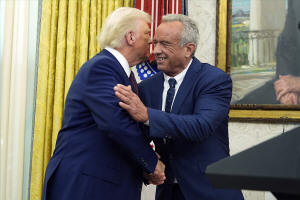Kennedy says panel will examine childhood vaccine schedule after
promising not to change it
 Send a link to a friend
Send a link to a friend
 [February 19, 2025]
By AMANDA SEITZ [February 19, 2025]
By AMANDA SEITZ
WASHINGTON (AP) — To earn the vote he needed to become the nation's top
health official, Robert F. Kennedy Jr. made a special promise to a U.S.
senator: He would not change the nation's current vaccination schedule.
But on Tuesday, speaking for the first time to thousands of U.S. Health
and Human Services agency employees, he vowed to investigate the
childhood vaccine schedule that prevents measles, polio and other
dangerous diseases.
“Nothing is going to be off limits,” Kennedy said, adding that
pesticides, food additives, microplastics, antidepressants and the
electromagnetic waves emitted by cellphones and microwaves also would be
studied.
Kennedy's remarks, which circulated on social media, were delivered
during a welcome ceremony for the new health secretary at the agency's
headquarters in Washington as a measles outbreak among mostly
unvaccinated people raged in West Texas. The event was held after a
weekend of mass firings of thousands of HHS employees. More dismissals
are expected.
In his comments Tuesday, Kennedy promised that a new “Make America
Healthy Again” commission would investigate vaccines, pesticides and
antidepressants to see if they have contributed to a rise in chronic
illnesses such as diabetes and obesity that have plagued the American
public. The commission was formed last week in an executive order by
Donald Trump immediately after Kennedy was sworn in as the president’s
new health secretary.

That directive said the commission will be made up of cabinet members
and other officials from the administration and will develop a strategy
around children’s health within the next six months. Kennedy said it
will investigate issues, including childhood vaccinations, that “were
formally taboo or insufficiently scrutinized."
While Kennedy did not directly call for changes to the vaccination
schedule on Tuesday, his plan to investigate it raises questions about
his commitment to Republican Sen. Bill Cassidy, a Louisiana physician
who harbored deep misgivings over the health secretary's anti-vaccine
advocacy. Cassidy ultimately voted to send Kennedy's nomination to the
Senate floor after he said Kennedy gave him assurances that he would not
alter the federal vaccine schedule.
“On this topic, the science is good, the science is credible," Cassidy
said during a Senate floor speech earlier this month explaining his
vote. "Vaccines save lives. They are safe.”
Rigorous studies of thousands of people followed by decades of
real-world use have proven that the vaccines approved by the Food and
Drug Administration for both children and adults safely and effectively
prevent diseases.
[to top of second column]
|

President Donald Trump congratulates Robert F. Kennedy Jr., after he
was sworn in as Health and Human Services Secretary in the Oval
Office at the White House, Thursday, Feb. 13, 2025, in Washington.
(Photo/Alex Brandon)
 Cassidy said during his Senate
speech last month that Kennedy had made a number of promises that
stemmed from “intense conversations" to garner his support.
Specifically, Cassidy said Kennedy would "maintain the Centers for
Disease Control and Prevention’s Advisory Committee on Immunization
Practices' recommendations without changes.”
Those recommendations are what pediatricians around the country use
to decide the safest and most effective ages at which to offer
vaccinations to children. The committee meets every year to review
the latest data on both old and new vaccines to ensure there are no
red flags for safety or other issues before publishing its annual
schedule.
When contacted about Kennedy's remarks, Cassidy's office did not
comment.
Kennedy gained a loyal following for his nonprofit by raising
objections to COVID-19 protocols and doubts around the COVID-19
vaccine. Despite his work, Kennedy repeatedly told senators that he
was not “anti-vaccine" during his confirmation hearings.
Dr. Paul Offit, an infectious-disease expert at Children's Hospital
of Philadelphia who sits on a federal vaccine panel, didn't believe
him.
“I think he will do everything he can to make vaccines less
available and less affordable because he’s an anti-vaccine
activist,” Offit, who developed the rotavirus vaccine that is on the
CDC's childhood immunization schedule, said last week.
Kennedy promised staffers on Tuesday during his speech that he would
keep an open mind in his new job and asked them to return the favor.
“A lot of times when I read these articles characterizing myself, I
think I wouldn’t want to work for that guy, either,” Kennedy said,
eliciting some laughs from the crowd. “Let's start a relationship by
letting go of any preconceived perceptions you may have of me.”
___
Associated Press writers Matthew Perrone and Lauran Neergaard in
Washington contributed to this report.
All contents © copyright 2025 Associated Press. All rights reserved
 |